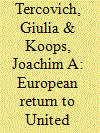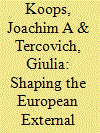|
|
|
Sort Order |
|
|
|
Items / Page
|
|
|
|
|
|
|
| Srl | Item |
| 1 |
ID:
149275


|
|
|
|
|
| Summary/Abstract |
This introductory article outlines the main rationale of the Special Issue and places the topic of the so-called ‘European Return to United Nations Peacekeeping’ in the wider context of recent policy developments and conceptual discussions related to the literature on UN troop contributions. It then outlines some of the key findings of the nine case studies (Denmark, France, Germany, Ireland, Italy, Norway, Sweden, the Netherlands and the United Kingdom) included in this issue. The article concludes that despite a recent engagement of a group of European countries in the Multidimensional Integrated Stabilization Mission in Mali (MINUSMA), expectations of a large-scale ‘return of Europe’ to UN peacekeeping are premature. While the MINUSMA experience will certainly spark important discussions and developments related to the future of UN peacekeeping and Western contributions, European countries will continue to commit only selectively troops on a case-by-case basis and only if a wide range of facilitating factors align as much as they did in the Mali case.
|
|
|
|
|
|
|
|
|
|
|
|
|
|
|
|
| 2 |
ID:
149279


|
|
|
|
|
| Summary/Abstract |
Italy was admitted to the United Nations (UN) in 1955. In a mix of ‘genetic multilateralism’ of Italian society and the ‘institutional multilateralism’ of the Italian Constitution, the UN soon acquired a central position in Italian foreign policy and Italian participation in the UN and its institutions became increasingly active. Italy is the top troop contributor to UN Peacekeeping operations among Western countries. Since the 1960s, Italy has participated in 33 UN Peacekeeping operations. The Italian commitment to the UN faced four main turning points: the launch of the UNOSOM II mission in Somalia (1992), the contribution to the UN Interim Administration Mission in Kosovo (1999), the involvement in Afghanistan and Iraq (2001–05), and the engagement with the UNIFIL II mission (2006). By providing an historical overview of Italy’s approach to UN Peacekeeping and explaining the different engagements and disengagements drive through the shift in the foreign policy priorities of the country and the influence of domestic factors; this article aims to answer to the following questions: ‘How much will Italy be willing to contribute to UN Peacekeeping in the future?’ and ‘Does Italy see other multilateral options (EU and NATO) as alternatives to the UN?’
|
|
|
|
|
|
|
|
|
|
|
|
|
|
|
|
| 3 |
ID:
174566


|
|
|
|
|
| Summary/Abstract |
The Lisbon Treaty recently celebrated its 10th anniversary. The 2009 legal text was an attempt to enhance the unity, consistency and effectiveness of the EU’s action in an increasingly volatile world. And yet, the post-Lisbon time period has been characterised by multiple crises coming from the West, the East, the South, and even from within the EU. Against this backdrop, our Special Issue makes a systematic assessment of the EU's foreign policy post-Lisbon and of its evolution by focusing on the role of the High Representative of the Union for Foreign Affairs and Security Policy (HR/VP). Assessing the post-Lisbon HR/VPs provides important insights on EU foreign policy processes over the past decade. In this introduction, we discuss the three research questions that guide our collection of articles, as well as our theoretical and empirical contribution to existing scholarly literature.
|
|
|
|
|
|
|
|
|
|
|
|
|
|
|
|
| 4 |
ID:
174567


|
|
|
|
|
| Summary/Abstract |
This article assesses the role, influence and core aspects of the EU High Representatives’ (HR/VPs) “political leadership” in the context of their efforts to advance the institutionalisation of the EEAS and its crisis management structures in the post-Lisbon era. By combining analytical lenses from the literature on “European political leadership”, foreign policy analysis (FPA) and political psychology with insights from a wide range of semi-structured interviews and primary sources, the article analyses how the leadership approaches of Catherine Ashton and Federica Mogherini were influenced by core aspects, such as institutional setting, situational factors and “personal qualities”. By examining how both HR/VPs and their chosen advisors sought to shape the EU’s EEAS and crisis management institutions, scholars can gain important insights about how “personal qualities” and prior foreign policy experience can influence the HR/VPs strategic choices and their impact within and across the EEAS. Finally, the article considers the differing effects between “maverick” and “orthodox” leadership and approaches and concludes that whilst outside perspectives can bring fresh ideas and institutional innovations, they will fail to be of lasting significance and permanence if not accompanied by sufficient support from the dominant foreign and security policy conventions.
|
|
|
|
|
|
|
|
|
|
|
|
|
|
|
|
|
|
|
|
|